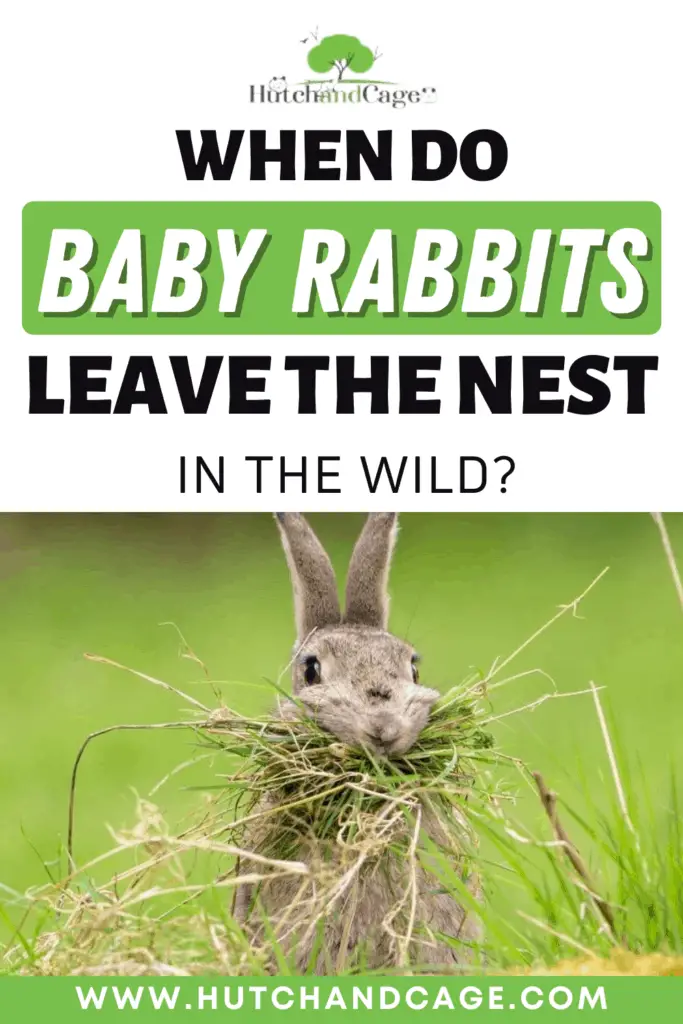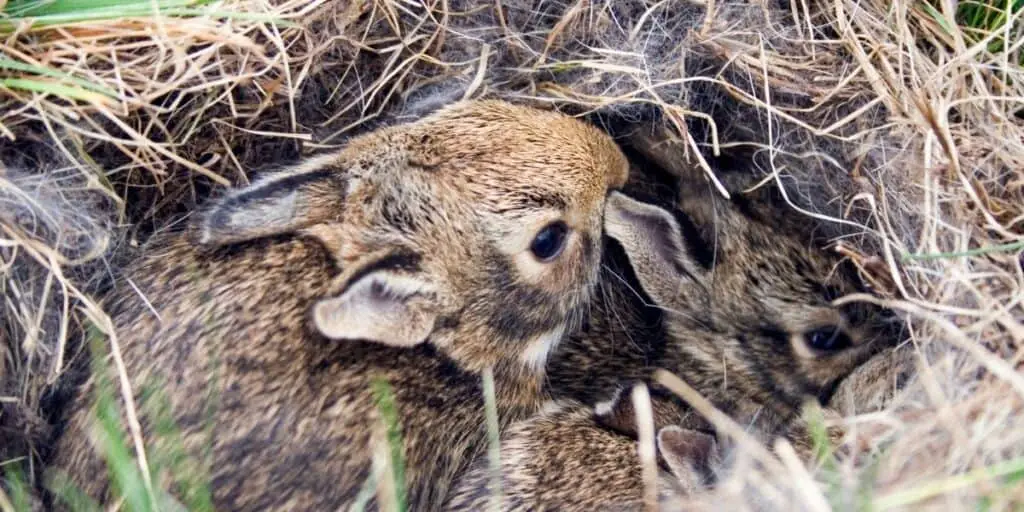Rabbits are incredibly interesting animals and while many are kept as pets, there are thought to be around 37,500 wild rabbits in the UK alone.
In China, the rabbit population is at almost a quarter of a million making this the most populated country for wild rabbits.
We can tell a lot from the behaviour of wild rabbits and if you’re a pet owner, you might be able to learn from your domestic bunny’s wild cousins.
In the wild, rabbits are prey animals and so their young do not leave the nest for at least three weeks. This allows the kits time to develop, open their eyes and be ready to face the big wide world.
From the moment they are born to the moment they leave the nest, baby rabbits undergo a massive change. Even before their arrival, mum will be frantically working away to keep her babies safe when they are born.

As a rabbit owner, this wild behaviour will likely be mimicking by a pet female.
Table of Contents
What Age Do Baby Rabbits Leave The Nest?
You’ve probably heard the term ‘breeding like rabbits’ and there is a very good reason why this phrase is so fitting. Female rabbits can become pregnant every four weeks and since the males are so keen to mate, if they are allowed, rabbits will keep reproducing.
While we would never recommend domestic breeders forcing a doe to mate this frequently, wild rabbits may have other ideas.
This rapid breeding means that baby rabbits need to be ready to leave the next in time for the next litter. By the age of three weeks, these kits will begin to emerge and see the world for the very first time.
By this point, they do not need as much care from their mothers but they will still feed from here twice a day, usually in the morning and at night.

Surprisingly rabbits only feed for a few minutes each time so if your pet has babies, don’t be surprised if they don’t seem to feed a lot.
When the kits first emerge from the nest in the wild, it can be shocking how small and helpless they look. At this point of their lives, they may be no bigger than a chipmunk, but if you see a wild rabbit like this and it has its eyes open, then it is perfectly fine and should be left alone.
This is because when rabbits are born, they are born with the eyes closed and they remain sealed shut until the babies are around two weeks old.
The reason for this is to allow the eyes to properly develop and is something that is seen in many animals including cats and dogs.
Should I Help A Wild Baby Rabbit?
As humans, if we see something small, we instantly assume that it is unsafe or needs to be rescued. While baby rabbits are undeniably cute, they might not always need you to swoop in and rescue them.
In fact, in most cases, they will simply be going about their business.
The best way to check whether a wild baby rabbit needs help is to see whether the eyes are open; if they are then this is a good sign that the rabbit is healthy and happy.
Furthermore, if the rabbit seems to be able to get around comfortable by itself, then it is likely able to function without assistance.
Baby rabbits who are out of the nest are typically able to fend for themselves and they will be ready to respond should a predator make an appearance.
Rabbits have exceptionally good hearing and will have their ears pricked up for most of the time when they are out of the nest. If you see a rabbit who looks alert, then he likely is.
One of the most obvious giveaways that a rabbit should be out of the nest is if it is covered in fur. Rabbits are born hairless and much like the eyes, this will develop over the three weeks that they spend in the nest.
What Should I Do If A Baby Rabbit Needs Help?
If you find a baby rabbit that you believe should not be out of the nest, then it may become your responsibility to source the help it needs to thrive.
The truth is that as few as 10% of orphaned baby rabbits will make it to adulthood and many die within days of being abandoned. However, if they are given the correct care, there is a very good chance that they will survive.
Depending on where you are in the world, it may be illegal to interfere with a baby rabbit if you do not have the assistance of a local wildlife organisation.
These trained professionals will know what to do and how to correctly handle the rabbit without harming it so it is vital to contact someone if you notice a rabbit that is in trouble.
If you have found a baby rabbit in your garden, it is likely that the nest is nearby, so it may be worth trying to locate it. Meanwhile, you should make sure that any children or pets are kept in the home until the rabbit has been removed.
However, if this is not possible, placing a temporary barrier around the rabbit, with a hole large enough for the mother to get through can offer some protection. If the mother does not return within 24 hours, you should call animal control.
Conclusion
Rabbits are surprisingly independent at a very young age. By the time they are three weeks old, they will have left the nest and be beginning to explore the world.
Although they will still feed off their mother for some time, the babies are perfectly capable of looking after themselves.
While it can be tempting to try to help a young rabbit, you must first be certain that it indeed needs this help. Observe the situation first and give the mother some time to find her kit.
If this doesn’t happen within a day, then you may need to call in a professional wildlife organisation to provide the rabbit with the right care.




